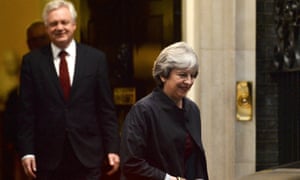White paper ‘most significant’ publication on UK relationship with EU since the referendum
Theresa May has announced plans to publish, ahead of a critical Brussels summit next month, a Brexit white paper setting out her priorities for Britain’s future relationship with the European Union.
In an attempt to get on the front foot in negotiations, the government will for the first time present a “detailed, ambitious and precise” explanation of what it hopes the final deal will deliver. The blueprint is expected to include a plan for a customs relationship that avoids re-establishing a hard Irish border, although the prime minister’s cabinet remains bitterly divided over how best to achieve this.
However, Whitehall insiders suggested there was no formal commitment to agreeing one of the two options, or to including details on the “backstop” plan for the border, by the time EU leaders meet for the summit in June.
The white paper, which could run to more than 100 pages, was signed off at cabinet on Tuesday morning, increasing pressure on the prime minister to finally take a decision on which of the customs arrangements she will back.
David Davis, the Brexit secretary, said the policy document would be the “most significant” publication on the EU since the referendum. He told cabinet colleagues: “It will communicate our ambition for the UK’s future relationship with the EU, in the context of our vision for the UK’s future role in the world.”
As well as customs, the white paper will cover the future security relationship, the financial services sector, aviation and fisheries. It will form part of ongoing negotiations with Brussels ahead of a political declaration in the autumn.
The prime minister’s inner Brexit cabinet, the source of much disagreement over future customs arrangements, discussed the white paper last month, with Brexiters led by Davis determined to set the agenda on talks with the EU.
Some felt that Brussels had outmanoeuvred Britain during previous negotiations by laying down their own terms first. However, the strategy is risky for May, who would face embarrassment if she failed to get agreement on most of her priorities.
One cabinet source told the Guardian: “This will allow us to go and actually negotiate with Brussels, although we still need agreement here first.”
EU negotiator Michel Barnier has reportedly told European ministers that neither of the UK’s customs option was realistic and that it was “unnecessary to fight” over two models that the EU would reject anyway.
Downing Street suggested the prime minister was undeterred by the comments. “As we’ve seen many times before, when you’re in a negotiation, you can expect people to set out their negotiating positions,” May’s spokesman said.
The prime minister’s inner cabinet remains split over the customs partnership model, in which the UK would collect taxes on behalf of the EU, believed to be her favourite, and the “max fac” option, which would seek to use technology instead.
The group held a 90-minute meeting on Tuesday without reaching agreement on which of the options it would back. Ministers heard presentations from Davis and Cabinet Office minister David Lidington on the work completed so far by two ministerial working groups set up last week.
The government could be forced on Wednesday to publish the private papers that have been prepared for the inner Brexit cabinet to help break the deadlock in their negotiations. Labour has tabled a motion, with a binding vote, that would require Downing Street to hand over to MPs all the presentations and economic analysis put before the ministers on the two post-Brexit customs options since January.
Paul Blomfield, the shadow Brexit minister, said: “It is deeply disturbing that, after yet another meeting, the cabinet still cannot agree on the most fundamental Brexit issues. Ministers have finally agreed to publish a white paper on the government’s negotiating position, but they still don’t know what it will say.
“Labour called for a white paper before article 50 was triggered. However, ministers have wasted months arguing amongst themselves rather than negotiating in the national interest. Today’s failure highlights the deep division at the heart of government on the most basic of issues. Whether those divisions can be resolved in the next month remains to be seen. If the cabinet can’t take the decisions, parliament will.”
The impasse on the customs arrangements comes amid reports that Downing Street has seen polls suggesting that about a third of Northern Irish voters support a united Ireland, but that a hard border would shift opinion further towards a breakaway from the UK.
However, the prime minister’s official spokesman said: “It remains the Northern Ireland secretary’s view that a majority of people in Northern Ireland continue to support the current political settlement and the circumstances requiring a border poll are not satisfied.”
